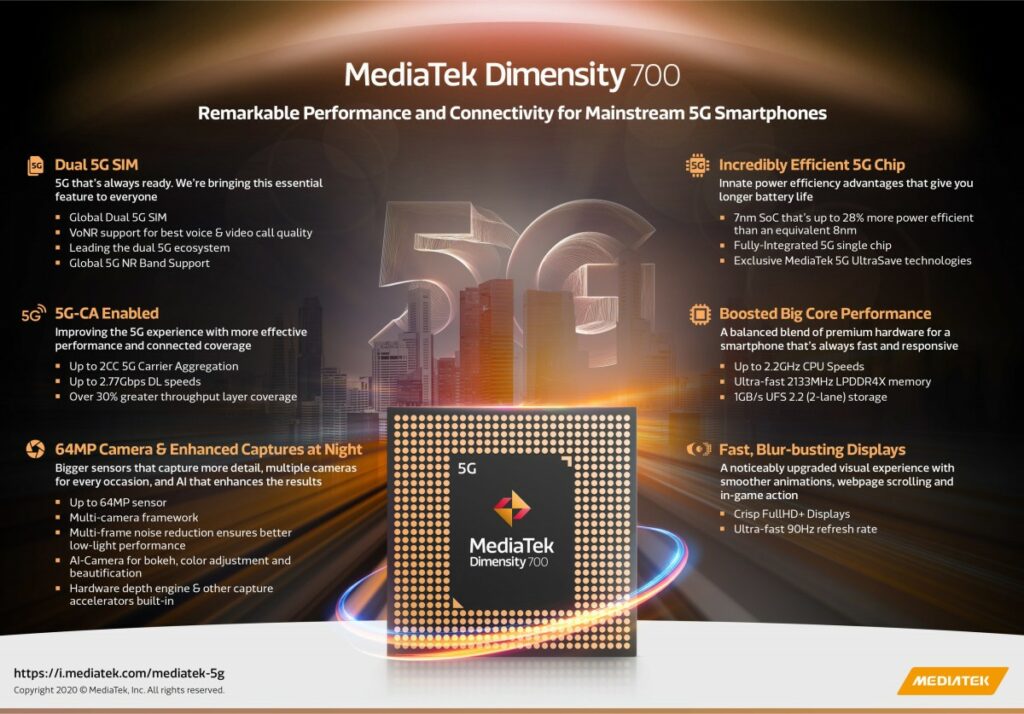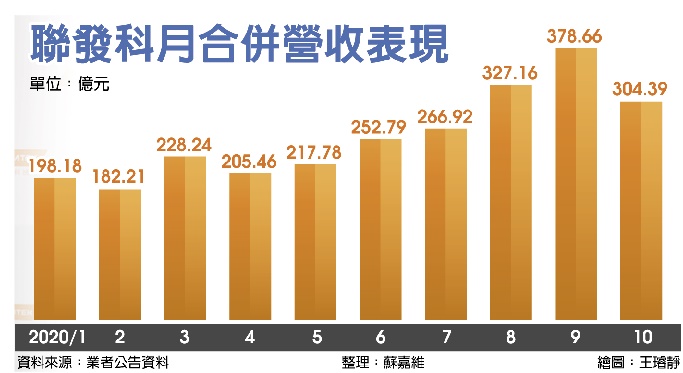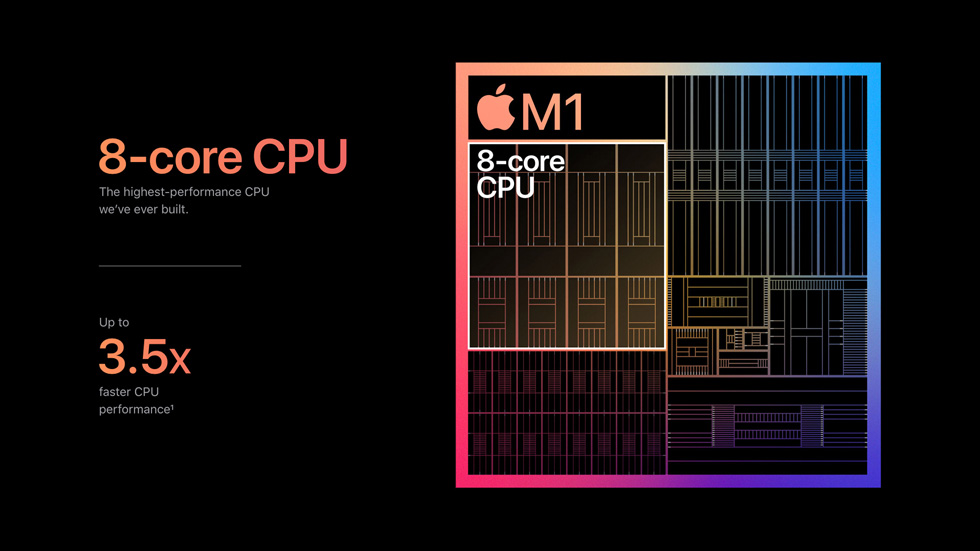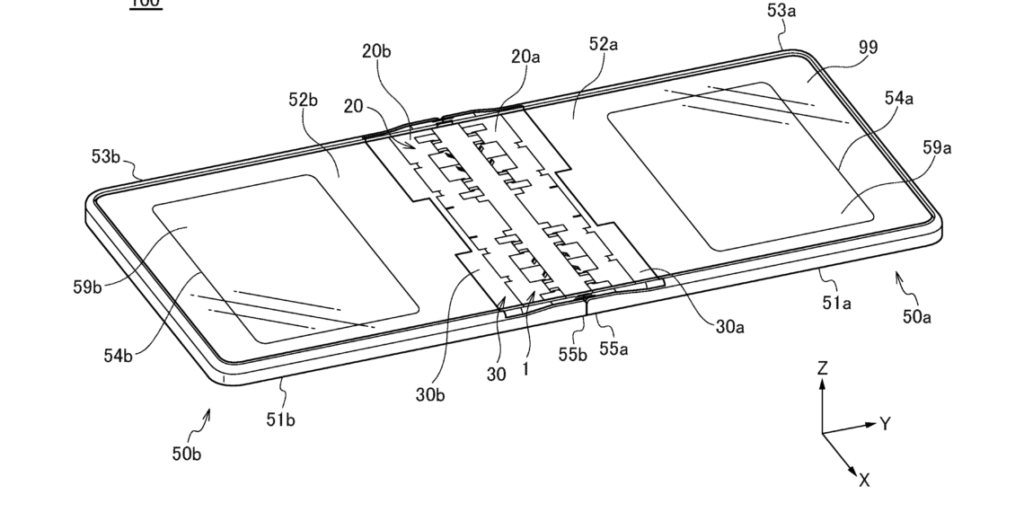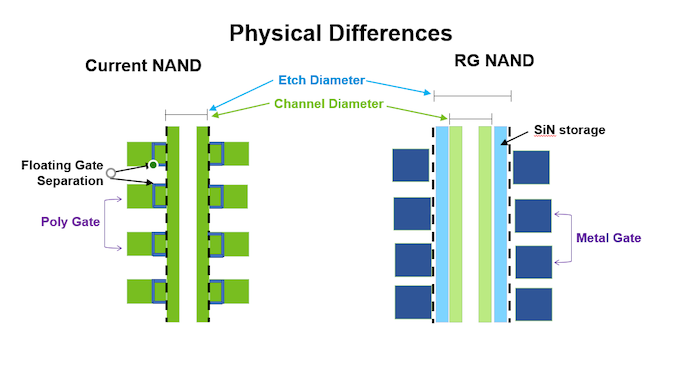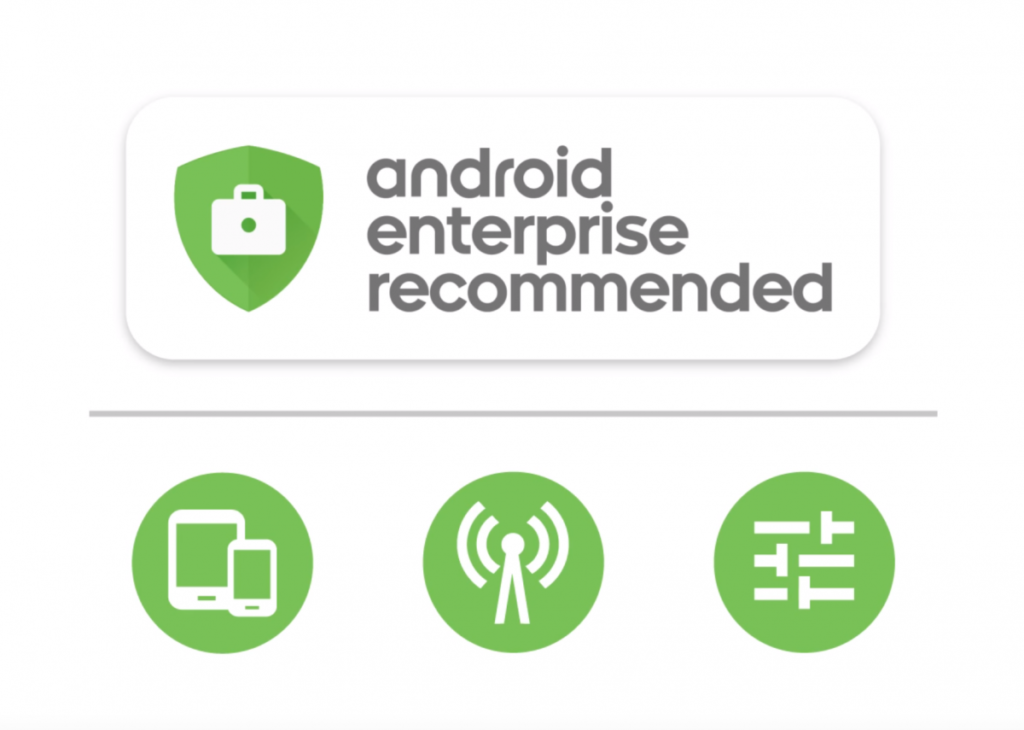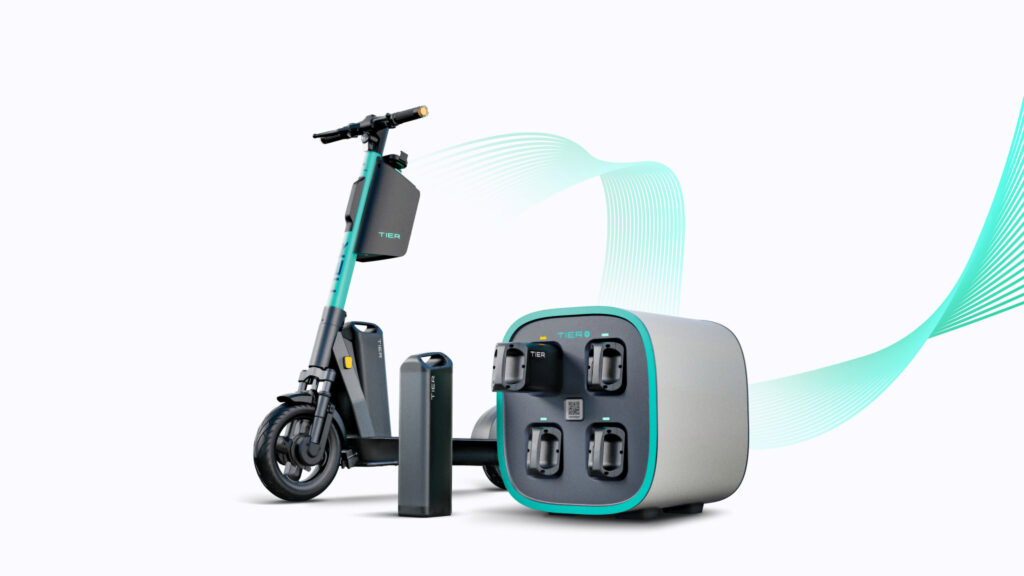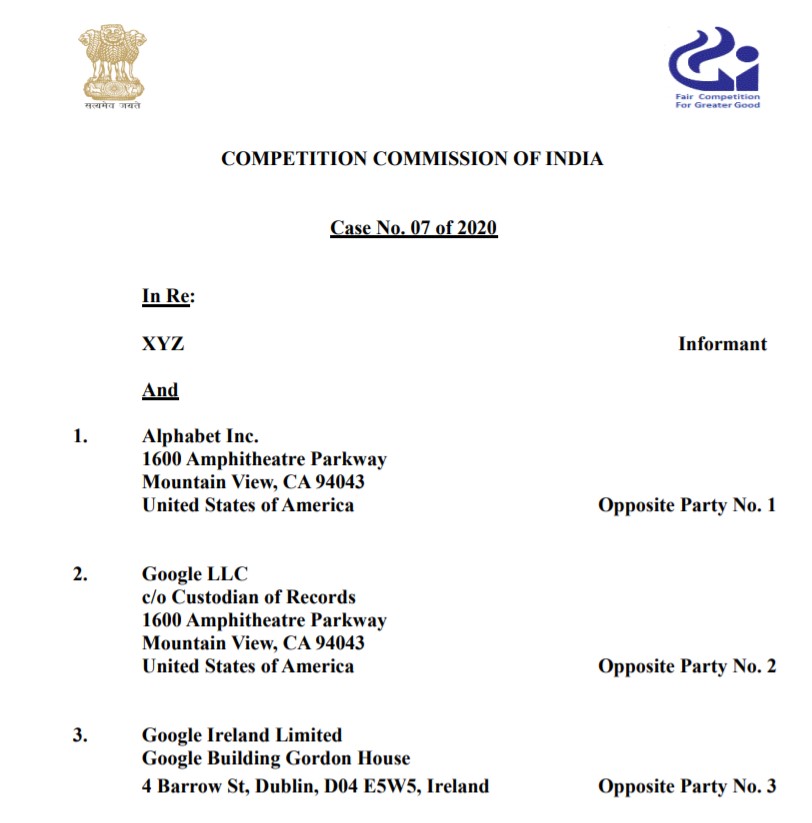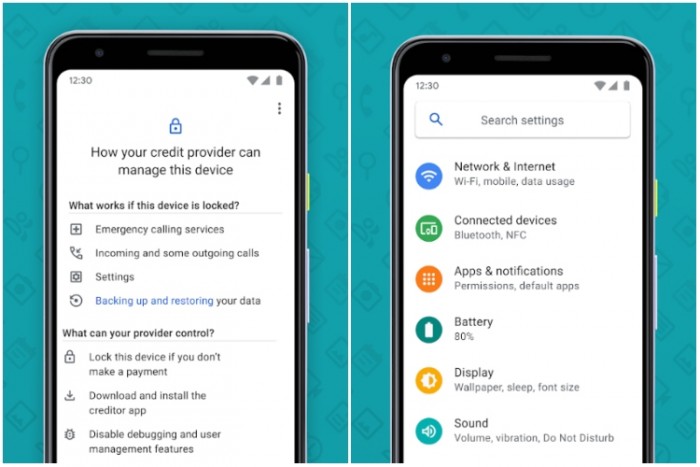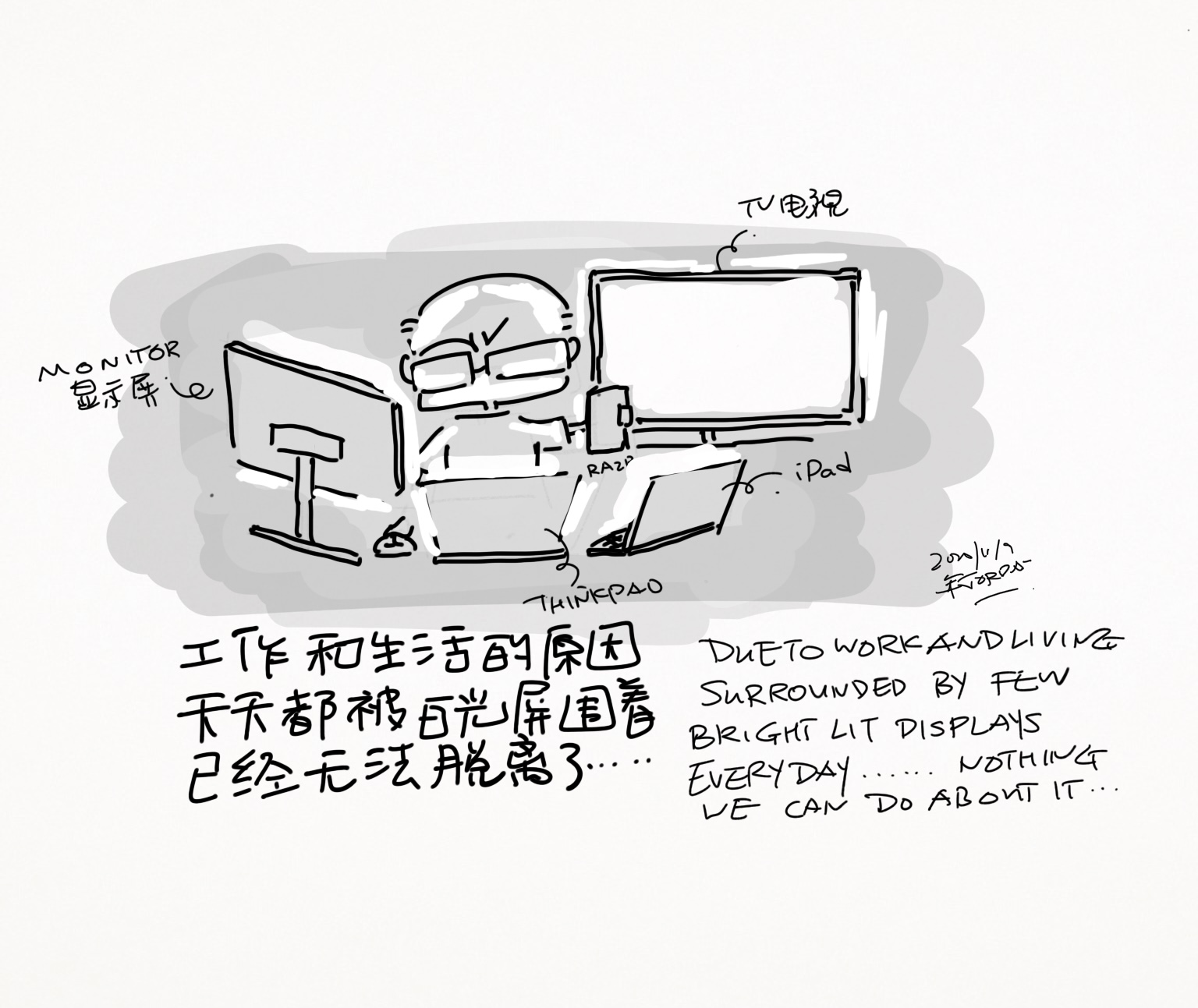
11-11 #Multiscreens: MediaTek announces Dimensity 700; Samsung plans to build an 8” wafer foundry in Xi’an; Huawei allegedly plans to sell budget-brand smartphone unit Honor; etc.
MediaTek is reportedly to launch a new platform based on the 6nm process technology and will have the same architecture as the upcoming Exynos 1080 platform by Samsung. The Mediatek chip has a model number of MT689x and will have a Mali-G77 GPU. (GSM Arena, MySmartPrice, Sina, iFeng)
MediaTek announces Dimensity 700, which is built on a 7nm process and serves up an octa-core design—two Cortex-A76 CPU cores clocked at 2.2Ghz and six Cortex-A55 cores. The new chipset also sports ARM’s Mali-G57 MC2 GPU, which suggests modest graphical performance. MediaTek is also rolling out 2 chipsets targeted at Chromebooks — the MT8192 and MT8195. The Dimensity 700 will be debuting on consumer phones in early 2021, and the MT8192 will show up in 2Q21. MT8195 will be available later 2021. (Android Authority, Android Central, GSM Arena, PR Newswire)
MediaTek expects to ship as many as 500M 5G-enabled chipsets in 2021. MediaTek’s that competes closely with the US-based rival Qualcomm, feels that it would turn a corner in 2021 with an aggressive focus on the next-generation technology. (Gizmo China, Economic Times, CTEE, UDN)
Samsung plans to build an 8” wafer foundry in Xi’an in a joint venture with local governments. It is reported that Samsung’s 8” wafer foundry in Xi’an is a 2.5-phase project, which is between the second and third phases of the Xi’an Samsung high-end memory chip project. Samsung’s foundry is mainly 12”, concentrated in South Korea, with only one 8” foundry. (CN Beta, Sina, 163)
Taiwan Semiconductor Manufacturing Co (TSMC) is to set up a wholly-owned subsidiary in Arizona with a paid-in capital of USD3.5B. The investment is part of the plan that TSMC announced in May 2020 to build a USD12B factory in Arizona. The company has said constructing the Arizona facility would start in 2021 with production targeted to begin in 2024 and that it would be able to process up to 20,000 silicon wafers per month. (CN Beta, Reuters, Telecom Lead)
Qualcomm Ventures, Qualcomm’s investment arm, has announced four new strategic investments in 5G-related startups. These companies are private mobile network specialist Celona, mobile network automation platform Cellwize, the edge computing platform Azion and Pensando, another edge computing platform that combines its software stack with custom hardware. (TechCrunch, News Break, Diglog)
Apple is introducing M1 chip. With 4 large performance cores, 4 efficiency cores, and an 8-GPU core GPU it features 16B transistors on the new 5nm process node. M1 delivers up to 3.5x faster CPU performance, up to 6x faster GPU performance, and up to 15x faster machine learning, all while enabling battery life up to 2x longer than previous-generation Macs. (GSM Arena, AnandTech, Apple, Apple)
Huawei has filed a patent for a complex hinge structure for foldable devices with a clamshell form factor. The design is meant to avoid creases. It achieves this by using a modular design. With this hinge design, the OLED panel contracts and expands when the phone is shut. (Gizmo China, Windows United, incoPat, IT Home, Sina)
LG Display (LGD) will expand the production rate of its organic light emitting diode (OLED) panel factory lines dedicated to Apple. The company will expand its E6-1 and E6-2 factory lines at Paju, South Korea. LGD is planning to put in low-temperature polycrystalline oxide (LPTO) thin-film transistors (TFT) equipment that can add 25,000 substrates per month in monthly production rate into the lines by 2021. (CN Beta, The Elec)
Micron is announcing their 5th generation of 3D NAND flash memory, with a record-breaking 176 layers. Their first 176L parts are 512Gbit TLC dies, built using string stacking of two 88-layer decks. The switch to a replacement gate/charge trap cell design seems to have enabled a significant reduction in layer thickness: the 176L dies are 45µm thick, about the same total thickness as Micron’s 64L floating-gate 3D NAND. (CN Beta, AnandTech, Micron, Extreme Tech)
Kioxia is bringing PCIe 4.0 support to their client NVMe product line with the new XG7 and XG7-P M.2 NVMe SSDs. The XG7 family doubles the sequential read speed and increases sequential write speed by 60% compared to the XG6 series, thanks to the PCIe 4.0 support and a new SSD controller. Based on XG6 specs, this should be at least 6.3GB/s reads and 4.6GB/s writes for the XG7. (CN Beta, Kioxia, AnandTech)
Huawei allegedly plans to sell budget-brand smartphone unit Honor in a CNY100B (USD15.2B) deal to a consortium led by handset distributor Digital China and the government of its home town of Shenzhen. Main Honor distributor Digital China Group will become a top-two shareholder of sold-off entity Honor Terminal with a near-15% stake. (CN Beta, IT Home, Sina, Reuters, Gizmo China)
realme has announced the start of its operations in Brazil. The company promises to bring a set of competitive smartphones to the country. Moreover, it will also bet in the AIoT range and 5G solutions. Brazil is yet to deploy its 5G networks, so realme wants to become a pioneer of the segment. (GizChina, Technoblog, Telecom Paper)
Apple Watch assembly partner Luxshare hopes to be able to work on the iPhone supply chain earlier than anticipated, with it is now preparing to make the iPhone 12 mini following the acquisition of a Wistron facility ahead of its acquisition. The facility may handle approximately 20% of total orders for the iPhone 12 mini. (Apple Insider, CN Beta, Asia Nikkei)
Samsung has announced it is joining the Android Enterprise Recommended Program, bringing its Galaxy smartphones and tablets to Google’s program. It is a Google-led program aimed at making it easier for enterprise businesses to integrate mobile solutions into their operations. (Android Headlines, Samsung)
Nokia 8 V 5G is announced for US Verizon supporting mmWave – 6.81” 1080×2400 FHD+ IPS LCD HiD, Qualcomm Snapdragon 765G, rear quad 64MP-12MP ultrawide-2MP macro-2MP depth + front 24MP, 6+64GB, Android 10.0, side fingerprint, 4500mAh 18W, USD699. (Android Central, Gizmo China, GSM Arena)
OPPO allegedly plans to launch tablets and notebooks in 2021 to diversify its portfolio. (GSM Arena, Weibo, IT Home)
Apple will reportedly discontinue the iPad mini after releasing first foldable iPhone. The foldable iPhone will be a cross between the iPhone and the iPad mini. The first foldable iPhone is expected to offer at least 8GB of RAM and 256GB of storage, and the baseline model will seemingly cost USD1,499. It will reportedly be unveiled in Nov 2022. (Phone Arena, The Verifier, Apple Track)
U.S. retailer Walmart and autonomous vehicle company Cruise are pairing up to test grocery delivery in Scottsdale, Arizona. Under the pilot program, customers will be able to place an order from their local Walmart store and have it delivered via one of Cruise’s autonomous, electric Chevy Bolt cars. While the vehicles will operate autonomously, a human safety operator will always be behind the wheel. (VentureBeat, TechCrunch)
Berlin-based micro-mobility startup Tier has raised a significant Series C round of USD250M led by SoftBank Vision Fund 2. The company plans to expand to more cities, deploy more vehicles and launch new products. The startup is also in the process of securing an important credit line to finance more vehicles. (TechCrunch, Tier, CNBC)
In its announcement about opening an antitrust case against Google, Indian watchdog Competition Commission of India (CCI) has said it is directing an in-depth investigation into the claims of whether the Android maker prominently promotes Google Pay during the setup of an Android smartphone (and whether phone vendors have a choice to avoid this); and if Play Store’s billing system is designed “to the disadvantage of both i.e. apps facilitating payment through UPI, as well as users”. (CN Beta, India Times, Live Mint, TechCrunch, CCI)
Google says they launched app “Device Lock Controller” in collaboration with a Kenyan carrier called Safaricom. Device Lock Controller enables device management for credit providers. The provider can remotely restrict access to user’s device if she does not make payments. If the device is restricted, basic functionality, such as emergency calling and access to settings, will still be available. The launch of Safaricom’s new “Lipa Mdogo Mdogo” (“Pay Bit by Bit”) financing plan that allows Kenyans to purchase a new Android Go Edition smartphone in affordable installments. (CN Beta, 9to5Google, XDA-Developers, Google)
De Nederlandsche Bank NV (DNB), the Dutch central bank, has started actively registering companies to provide cryptocurrency services. As a result of the implementation of the fifth EU Anti-Money Laundering Directive (5AMLD), providers of exchange services between cryptocurrencies and fiat currencies and providers of custodial wallets must apply for registration with the central bank. They must demonstrate compliance with the requirements of the Money Laundering and Terrorist Financing (Prevention) Act and the Sanctions Act of 1977. (CN Beta, Coin Quora, News Bitcoin)


